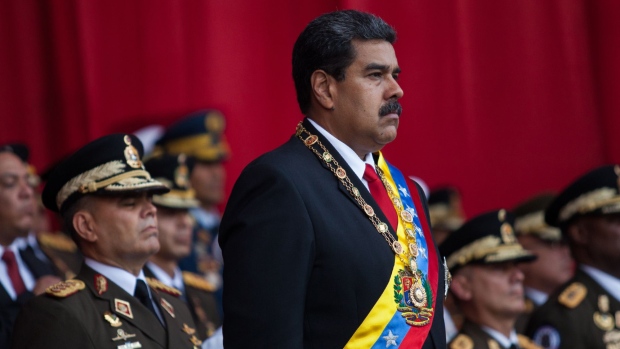Aug 30, 2019
Caracas Diplomats Shun Maduro. Then Flip
, Bloomberg News

(Bloomberg) -- In March, when Venezuelan opposition leader Juan Guaido returned to Caracas from a triumphant tour abroad gaining recognition as the legitimate leader over President Nicolas Maduro, the German ambassador -- along with a few other envoys -- was at the airport to welcome him in a public display of support.
It wasn’t long before Maduro’s government stripped the ambassador, Daniel Kriener, of his credentials and expelled him. Kriener left for Berlin, his government’s policy intact, his head held high.
But in July, in a sign of the doom surrounding the U.S.-led effort to oust Maduro, the German envoy was back in Caracas and back to his previous duties: dealing with the Maduro government. Two weeks ago he joined European colleagues at a meeting with Maduro’s foreign minister, Jorge Arreaza. Arreaza also held official meetings in Spain and Portugal, which have both aligned with Guaido.
The diplomatic jujitsu is a reflection of a dawning reality: Maduro remains as in charge today as ever, conducting the nation’s business, despite recognition of Guaido by more than 50 capitals.
Read more: Why Venezuela Has Two Presidents, One Thorny Standoff - QuickTake
The back-and-forth has been head spinning. Earlier this year, Caracas-based diplomats updated contact lists, replacing Maduro associates with those of Guaido. Many military attaches were sent home to avoid dealing with Maduro’s generals. One European country invited only Guaido officials to its national day celebration. To avoid a conflict, a Latin American country called off its annual celebration. Many of the diplomats interviewed for this article spoke on the condition that their country remain anonymous to avoid irritating both sides in the dispute.
All of this created concerns about security, since Guaido’s aides are under constant threat of arrest. It also raised more mundane issues, like obtaining diplomatic license plates.
A couple of months ago, two officials from one of the most aggressively anti-Maduro governments couldn’t get their goods shipped back to their home country because officials refused to stamp the boxes at the port. A customs officer seemed to take pleasure in asking them: “Why don’t you ask Guaido to take care of your move?” The officials’ government sent a solicitous letter requesting customs approval, which ultimately was given.
A Latin American official who is not authorized to discuss the matter publicly said his country made a mistake by recognizing Guaido so quickly. Now, he said, diplomats have to do “crazy things” they never learned from textbooks.
What is becoming clear is that recognition of Guaido will exist at a kind of symbolic level. But despite evidence that tough U.S. sanctions on Venezuela are taking a growing toll on Maduro and his associates, day-to-day business is being conducted with the Maduro government.
Spain, for example, shelters a top Guaido colleague, Leopoldo Lopez, who has been living in its official residence in Caracas for months. Meanwhile, its relations with Maduro are unchanged from last year.
The prime minister of Curacao, a Caribbean island controlled by the pro-Guaido government of the Netherlands, recently received Manuel Quevedo, the head of Maduro-controlled oil giant Petroleos de Venezuela SA. They discussed PDVSA’s bid to renew a deal to operate a refinery on the island.
Diplomatic Credentials
And while Brazil fully recognized Guaido’s envoy as ambassador, it has requested and obtained from the Maduro government the renewal of some officials’ diplomatic credentials.
In a statement, Brazil’s foreign ministry said Venezuela is a unique case in which a legitimate, constitutional government and an illegitimate dictatorship coexist. It expressed the hope that both would continue to abide by the Vienna Convention, which ensures immunity and privileges for foreign diplomats.
Maduro has been under increasing foreign pressure since he was sworn in for a second term in early January, following elections widely condemned as rigged. Tensions escalated on January 23, when Guaido, then leader of the National Assembly, declared himself president. He and his allies vowed to restore the rule of law to a nation that is wracked by hyperinflation, hunger and rampant corruption.
The U.S. immediately recognized Guaido, followed by dozens of countries on all continents. Meanwhile governments that support Maduro have also found themselves with an unappealing set of choices. Russia and China, both Maduro backers, have had numerous contacts with Guaido allies.
All of which shows, according to Oliver Stuenkel, professor of international relations at São Paulo think tank Fundação Getulio Vargas, the limits of diplomatic pressure.
“This was all a big, risky gamble,” he said of the move by foreign governments to replace Maduro with Guaido. “Europeans, no matter how much they may deny it, have already started this process of getting back to business as usual with Maduro. Latin America countries will eventually have to do the same.”
To contact the reporter on this story: Samy Adghirni in Brasilia Newsroom at sadghirni@bloomberg.net
To contact the editors responsible for this story: David Papadopoulos at papadopoulos@bloomberg.net, Ethan Bronner, Melinda Grenier
©2019 Bloomberg L.P.






